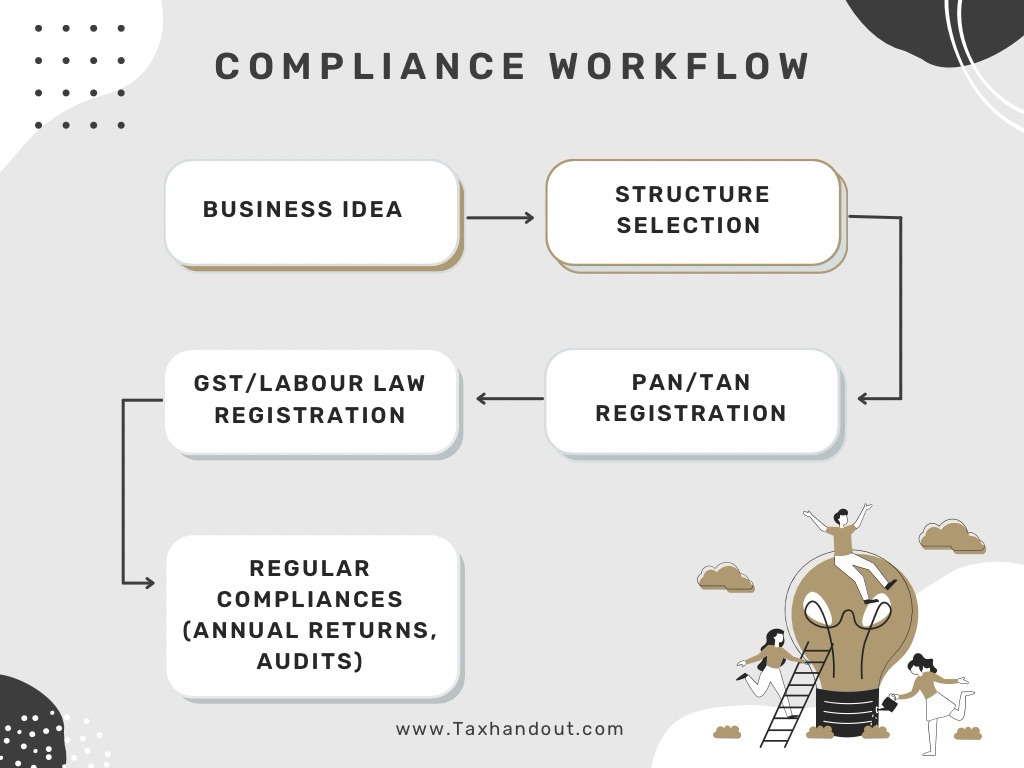Starting a new business in India involves careful planning and adherence to essential legal and tax requirements. Whether you’re setting up a small shop or a private limited company, knowing these steps will help you start on the right foot.
Step-by-Step Checklist for Starting a Business
Here’s a simplified checklist to ensure your business meets all necessary legal and tax compliance requirements before operations begin:
| Step | Compliance Activity |
|---|---|
| 1 | Decide business structure (Sole Proprietorship, Partnership, LLP, Pvt Ltd.) |
| 2 | Obtain PAN and TAN from Income Tax Department |
| 3 | Register for GST if turnover threshold crosses ₹20 lakh |
| 4 | Register under Shops & Establishments Act |
| 5 | Apply for Professional Tax registration (State-specific) |
| 6 | Register for EPF (Employee Provident Fund) and ESI (Employee State Insurance) if applicable |
| 7 | Obtain MSME (Udyam) registration for benefits |
| 8 | Secure industry-specific licenses (FSSAI, Trade License, Pollution Clearance, etc.) |
| 9 | Maintain proper books of accounts and plan for annual audit |
| 10 | Register Intellectual Property (Trademarks, Patents) |
Important Tax Registrations Explained
1. PAN & TAN:
PAN (Permanent Account Number): Mandatory for all businesses to file income tax. TAN (Tax Deduction and Collection Account Number): Required for businesses deducting TDS (Tax Deducted at Source).
2. GST (Goods & Services Tax):
Mandatory for businesses crossing turnover thresholds or involved in interstate supply.
GST Threshold Limits:
| Category | Threshold Limit (₹) |
| Regular States | ₹20 lakh |
| Special Category States (NE, J&K) | ₹10 lakh |
| Interstate Supply & e-commerce | Mandatory (No limit) |
Labour Law Compliances
Businesses must comply with labor laws ensuring employee benefits and safety:
| Compliance | Applicability | Threshold |
| Employees’ Provident Fund | Employees ≥ 20 | 20 Employees |
| Employees’ State Insurance | Employees ≥ 10, salary ≤ ₹21,000 | 10 Employees |
| Shops & Establishments Act | All commercial establishments | All Businesses |
Sector-Specific Registrations
| Business Type | License/Registration |
| Restaurants | FSSAI Food License |
| Factories | Pollution Control Clearance |
| Exporters | IEC Code (DGFT) |
Visual Representation of Compliance Workflow

Regular Compliance and Filings
Maintaining compliance is continuous:
- Filing of Income Tax returns annually.
- GST returns monthly/quarterly.
- Annual ROC filings for companies.
- Periodic audits depending on business structure and turnover.
Why Compliance Matters?
Proper compliance:
- Protects your business from legal penalties.
- Enhances credibility and reputation.
- Ensures smooth operations without regulatory interruptions.
Conclusion
Following the legal and tax compliance roadmap carefully will safeguard your business from unnecessary challenges. Start right, stay compliant, and enjoy sustainable growth.

